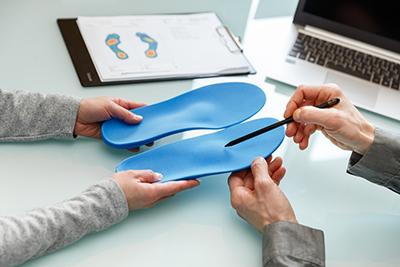Types of Orthotics Available and How They Can Help Your Feet

- posted: Jun. 14, 2022
Turn to a podiatrist to find out more about orthotics and their benefits
If you are dealing with sore, tired, and achy feet you may be wondering whether you should turn to a podiatrist for custom orthotics. Custom or prescription orthotics are far more effective than those over-the-counter, one-size-fits-all orthotics you’ll find at your local drugstore. Luckily, podiatrists craft orthotics to fit your needs and your feet, so they are tailored to you. Here are the types of custom orthotics that are available.
What are orthotics?
Orthotics are in-shoe devices that help to correct structural abnormalities within the foot that may impact how the foot, ankle, leg, and hip function. Prescription orthotics are specially crafted by a foot and ankle specialist to correct issues you’re dealing with, manage symptoms and improve movement overall.
What are the types of custom orthotics?
Orthotics are categorized as accommodative or functional,
Accommodative orthotics
These types of orthotics are most often recommended for those who are dealing with injuries, pain, and other similar problems that may require additional cushioning and support. These orthotics are typically made from a soft, flexible material, making them more about comfort than functionality (even though they may be able to control abnormal movements, as well). Accommodative orthotics are often best for,
- Calluses and corns
- Diabetic foot ulcers or diabetic feet
- Arch support
- Heel pain
- Chronic pain
Functional orthotics
This orthotic is made from a semi-rigid or rigid material, making it the ideal option for correcting faulty biomechanics and gait issues within the feet. Functional orthotics can help stabilize the foot and ankle and may be an ideal option for athletes as well as those who are prone to tendonitis, bursitis, hip pain, and shin splints. Of course, if you aren’t sure which type of orthotic is right for you, you should speak with your podiatrist.
What goes into getting orthotics?
Before getting custom orthotics, your podiatrist will need to perform a comprehensive assessment of the foot, ankles, knees, and hips to understand what structural or functional issues you’re dealing with. This examination is straightforward and non-invasive. From there, a plaster cast of your foot will be made to help craft your custom-fitted orthotics. Once your orthotics are ready, you’ll come back into the office to have them fitted.
Most people can benefit from custom orthotics. If you want to find out which type of orthotics are right for you and how they could support your feet, talk with your podiatrist today.

- posted: Jun. 14, 2022
Turn to a podiatrist to find out more about orthotics and their benefits
If you are dealing with sore, tired, and achy feet you may be wondering whether you should turn to a podiatrist for custom orthotics. Custom or prescription orthotics are far more effective than those over-the-counter, one-size-fits-all orthotics you’ll find at your local drugstore. Luckily, podiatrists craft orthotics to fit your needs and your feet, so they are tailored to you. Here are the types of custom orthotics that are available.
What are orthotics?
Orthotics are in-shoe devices that help to correct structural abnormalities within the foot that may impact how the foot, ankle, leg, and hip function. Prescription orthotics are specially crafted by a foot and ankle specialist to correct issues you’re dealing with, manage symptoms and improve movement overall.
What are the types of custom orthotics?
Orthotics are categorized as accommodative or functional,
Accommodative orthotics
These types of orthotics are most often recommended for those who are dealing with injuries, pain, and other similar problems that may require additional cushioning and support. These orthotics are typically made from a soft, flexible material, making them more about comfort than functionality (even though they may be able to control abnormal movements, as well). Accommodative orthotics are often best for,
- Calluses and corns
- Diabetic foot ulcers or diabetic feet
- Arch support
- Heel pain
- Chronic pain
Functional orthotics
This orthotic is made from a semi-rigid or rigid material, making it the ideal option for correcting faulty biomechanics and gait issues within the feet. Functional orthotics can help stabilize the foot and ankle and may be an ideal option for athletes as well as those who are prone to tendonitis, bursitis, hip pain, and shin splints. Of course, if you aren’t sure which type of orthotic is right for you, you should speak with your podiatrist.
What goes into getting orthotics?
Before getting custom orthotics, your podiatrist will need to perform a comprehensive assessment of the foot, ankles, knees, and hips to understand what structural or functional issues you’re dealing with. This examination is straightforward and non-invasive. From there, a plaster cast of your foot will be made to help craft your custom-fitted orthotics. Once your orthotics are ready, you’ll come back into the office to have them fitted.
Most people can benefit from custom orthotics. If you want to find out which type of orthotics are right for you and how they could support your feet, talk with your podiatrist today.
